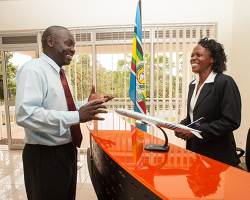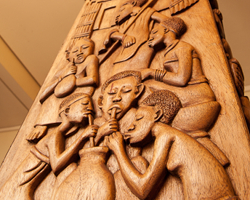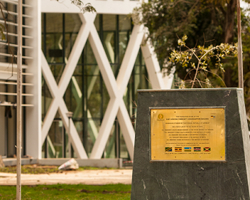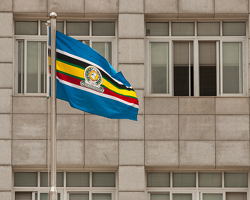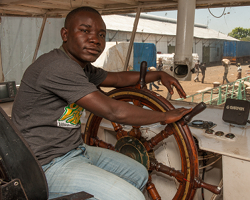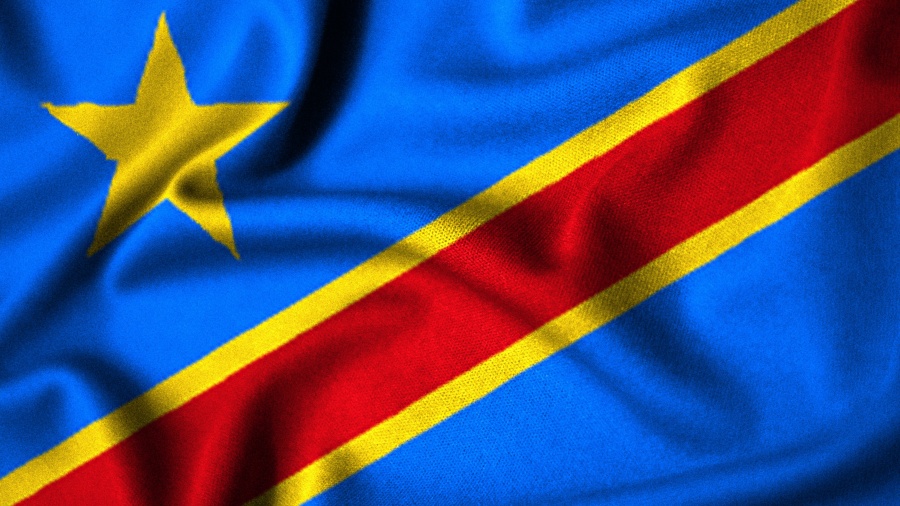
Admission of the Democratic Republic of the Congo (DRC) into the EAC: Frequently Asked Questions (FAQs)
1. An overview of the journey of DRC joining the bloc
1. An overview of the journey of DRC joining the bloc
- In June 2019,the President of the Democratic Republic of the Congo (DRC), H.E. Félix-Antoine Tshisekedi Tshilombo, wrote to the then EAC Chairperson, President of Rwanda, H.E. Paul Kagame, expressing his country's wish to be a member of the bloc
- On 27 February, 2021 during their 21st Ordinary Meeting, the Summit of the EAC Heads of State considered the application by DRC to join the Community and directed the EAC Council of Ministers to expeditiously undertake a Verification Mission in accordance with the EAC procedure for admission of new members.
- In July 2021,the EAC undertook a Verification Mission to the DRC with the objective of establishing the country’s level of conformity in accordance with Article 3 (2) of the Treaty for the Establishment of the EAC.
- On 22 December, 2021 the 19th Extra-Ordinary Summit of the EAC Heads of State received and considered the report of the Verification Mission to DRC and directed the Council to expeditiously commence and conclude negotiations with the DRC for admission into the bloc..
- The negotiations between the EAC and DRC were successfully conducted from 15 to 24 January, 2022 in Nairobi, Kenya, with Kinshasa reaffirming willingness to be part of the bloc.
- Following the negotiations, the EAC Council of Ministers recommended to the Summit to consider admitting DRC into the Community in accordance with Article 3 (3) of the Treaty.
- On 29 March, 2022 the Summit of EAC Heads of State at their 19th Extra-Ordinary Meeting, admitted DRC into the EAC following the recommendation by the EAC Council of Ministers. The Chairperson of the Summit and President of Kenya, H.E Uhuru Kenyatta, informed the meeting that DRC had met all the set criteria for admission as provided for in the Treaty.
2. What is the process of integrating DRCs into the bloc?
2. What is the process of integrating DRCs into the bloc?
- Assession to The Treaty Establishing the East African Community
- Depositing the instrument of acceptance with the Secretariat.
- DRC will join EAC’s areas of cooperation
- Roadmap for integration of EAC
3. How will DRC’s admission contribute to the strengthening of integration within the East African region?
3. How will DRC’s admission contribute to the strengthening of integration within the East African region?
Benefits of DRC joining the bloc
i. Market Expansion:
DRC’s population of over 90 million has the potential to contribute to expanded market and investment opportunities.
ii. Geographical and geopolitical location:
DRC shares borders with 5 of the EAC Partner States, namely Tanzania, Burundi, Rwanda, Uganda and South Sudan. There is a sense of belonging and attachment to EAC socially, economically, historically, culturally and geographically.
iii. Interlinkages:
DRC has the potential to link the Indian Ocean to the Atlantic Trade Corridor and further link the region to North Africa, Central Africa and other continental sub-regions.
iv. Infrastructure:
Development of infrastructure in DRC will facilitate connectivity of the East to the Atlantic coast and Southern Africa to Northern and West Africa. Connecting the DRC railway network with the EAC will provide an opportunity for increasing access to both DRC and EAC markets. This interconnectivity of railroads also has the potential of reducing the cost of intra-regional trade.
v. Strengthening EAC Power pool:
Development of the INGA Dam is an Agenda 2063 flagship project that can contribute to the East African Power Pool.
4. What are the benefits of DRC joining the EAC?
4. What are the benefits of DRC joining the EAC?
- DRC will benefit from the larger EAC Commn Market and Common External Tariff framework
- DRC will also have access to the seaports of Mombasa and Dar es Salaam at competitive rates.
5. How is the EAC preparing to accommodate Swahili and French as official languages?
5. How is the EAC preparing to accommodate Swahili and French as official languages?
6. How is EAC prepared to handle the cases of instability and conflict in DRC?
6. How is EAC prepared to handle the cases of instability and conflict in DRC?
7. How is EAC addressing the issue of Non-Tariff Barriers?
7. How is EAC addressing the issue of Non-Tariff Barriers?
8. Why is the EAC not changing its name now that DRC which sits in Central and Western Africa has joined the bloc?
8. Why is the EAC not changing its name now that DRC which sits in Central and Western Africa has joined the bloc?
9. Can any country join the EAC or what parameters are used to allow some?
9. Can any country join the EAC or what parameters are used to allow some?
- Geographical proximity to and inter-dependence between it and the Partner States;
- Acceptance of the Community as set out in this Treaty;
- Adherence to universally acceptable principles of good governance, democracy, the rule of law, observance of human rights and social justice;
- Potential contribution to the strengthening of integration within the East African region;
- Establishment and maintenance of a market-driven economy; and
- Social and economic policies being compatible with those of the Community

